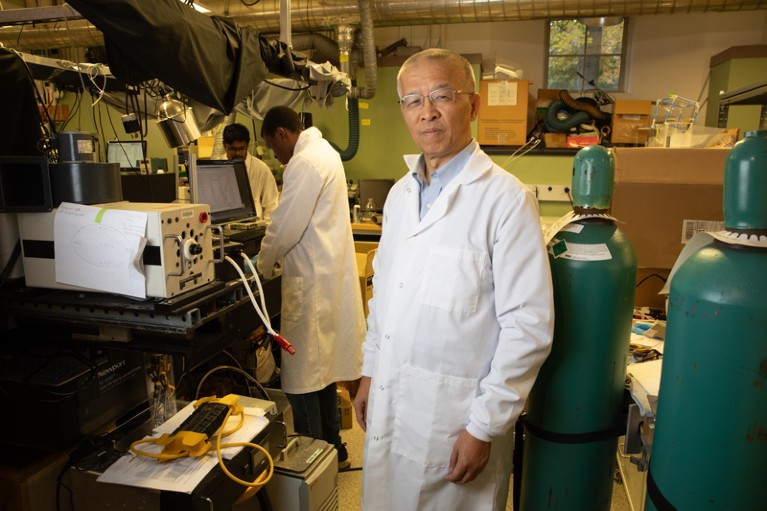
Engineer Gang Chen changed his research focus after being wrongly accused of espionage.Credit: Tony Pulsone, MIT
When an engineer of Chinese descent, who wishes to remain anonymous, took a flight back to his US university from a conference in Canada in September last year, he got a surprise at a stopover in Chicago, Illinois. The captain asked everyone to show their passports to border agents at the gate. The engineer, who has a Chinese passport and a green card to live and work permanently in the United States, estimates that he was detained for 90 minutes, and was asked to share his phone and laptop passwords or surrender his devices. He recalls being asked about his research, collaborations and recent publications with Chinese colleagues, and whether any of technologies they worked on were being transferred anywhere else.
The unsettling experience prompted him to pull his name from joint publications with his collaborators in China. “I was considering changing my passport to become a US citizen before this incident, but now I’m just not sure,” he adds. “They are treating us like spies.”
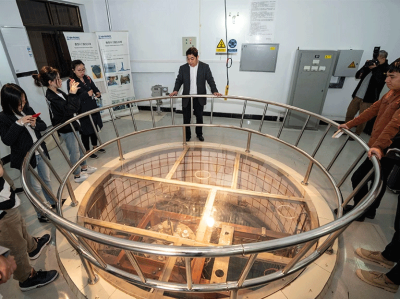
Why it would be a dangerous folly to end US–China science pact
In a separate incident, Gang Chen, a mechanical engineer at the Massachusetts Institute of Technology (MIT) in Cambridge, was arrested in 2021 for allegedly hiding his ties to China. The charges were dropped in 2022, but he’s become a go-to adviser for other interrogated researchers. “The border is a place of terror for many of us,” he says. “Most people don’t want to share their stories publicly.” Nature spoke to several academics about similar interrogations of researchers of Chinese descent. Many preferred to remain anonymous, citing concerns about career reprisals. (Requests for comment on the motivation for these detentions went unanswered by the US Department of Homeland Security.)
These are just some of the enduring ripple effects from the China Initiative, a policy brought in by the Department of Justice (DoJ) under the administration of former president Donald Trump. From 2018 to 2022, it sought to prosecute perceived Chinese spies in US research after concerns were raised by a Senate investigation into inappropriate transfers of knowledge and funding to China from US laboratories. The Center for Strategic and International Studies, a think tank in Washington DC, has identified 224 reports of Chinese espionage against the United States since 2000 — with 29% related to the theft of military technology (see go.nature.com/3t6cwjn).
Toxic atmosphere
Table of Contents
The massive scale of the problem led to counter-espionage policies that conflated nationality with ethnicity and resulted in a ‘guilty until proved innocent’ atmosphere. For Chinese scholars, border detainments are but one facet of ongoing scrutiny. According to a database compiled by the publication MIT Technology Review, the DoJ had brought charges against 162 defendants under the initiative by the end of 2021 (including institutions and companies; see go.nature.com/48ptwuj). However, the department’s actions were roundly criticized by legal scholars and researchers as excessive — with many scientists of Chinese descent who were conducting fundamental research being targeted for minor errors or omissions on grant applications.
Although the DoJ officially ended the China Initiative in February 2022, the chilling climate that the policy created very much persists today, says Jenny Lee, who studies migration policies and geopolitics in higher education at the University of Arizona’s Center for the Study of Higher Education in Tucson. Adding to the unease, in November 2023, the US House of Representatives appropriations committee, which oversees government expenditures, called on the DoJ to reinstate the initiative.
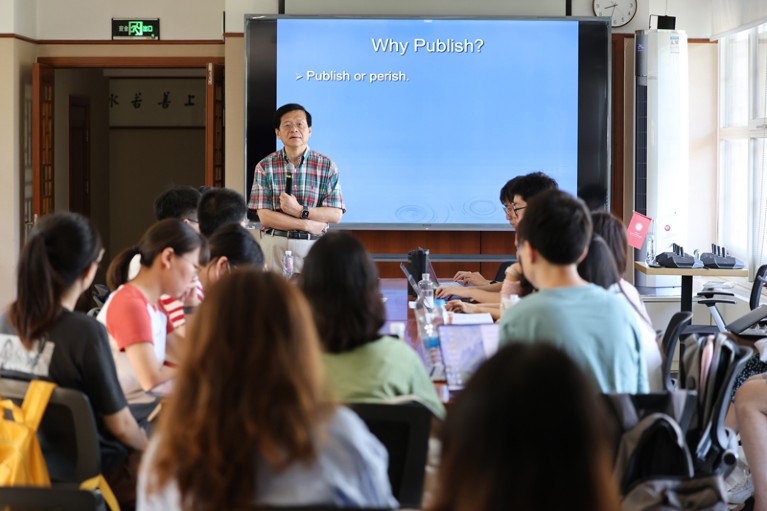
Sociologist Yu Xie has documented the environment of fear in surveys of US-based researchers of Chinese descent.Credit: Jiayi Lu
Since 2018, China has been the top global producer of articles in leading scientific publications. Under the administration of President Joe Biden, scientific and educational collaborations between China and the United States have continued to unravel. The strained ties threaten not only current collaborations, but also the historically strong networks that US-based Chinese researchers have with colleagues back home.
“The US needs China more than China needs the US,” says Lee. “Policymakers need to realize ethnic Chinese [researchers] are one of our greatest assets to help build trust with Chinese nationals.”
Fear of scrutiny alters careers
It’s not just Chinese scientists who are being detained. George Karniadakis, a Greek American mathematician at Brown University in Providence, Rhode Island, who works with many Chinese scientists, has been stopped at the US border twice in the past year. On both occasions, his laptop and phone were confiscated but eventually returned. Since 2021, three of his postdoctoral researchers and one visiting PhD student — all from China — have been interrogated at US airports when they returned from trips home. Ultimately, they decided to leave the United States. Two other Chinese researchers he’d hired were stopped at the border and denied entry.
“I usually have 20 scientists from China in my group; I currently have 8,” he says. “We are doing fundamental mathematics research —this is not applied science.” His work underpins artificial intelligence and machine learning. Unlike previous years, this year he received no applications from graduates of Peking University in Beijing, one of the top maths programmes in the world, to join his group.
Alongside increased border surveillance of their researchers, universities are also grappling with guidelines stemming from the 2022 US CHIPS and Science Act, which provides US$52.7 billion for domestic semiconductor research. The guidelines suggest that research universities receiving federal funding must certify that no researchers or students are participating in “a malign foreign talent recruitment program”. For example, MIT now asks researchers who receive Department of Energy (DoE) funding to certify that they have made reasonable efforts to determine that students or researchers are not participating in any talent-recruitment programmes involving China, Russia, North Korea or Iran.
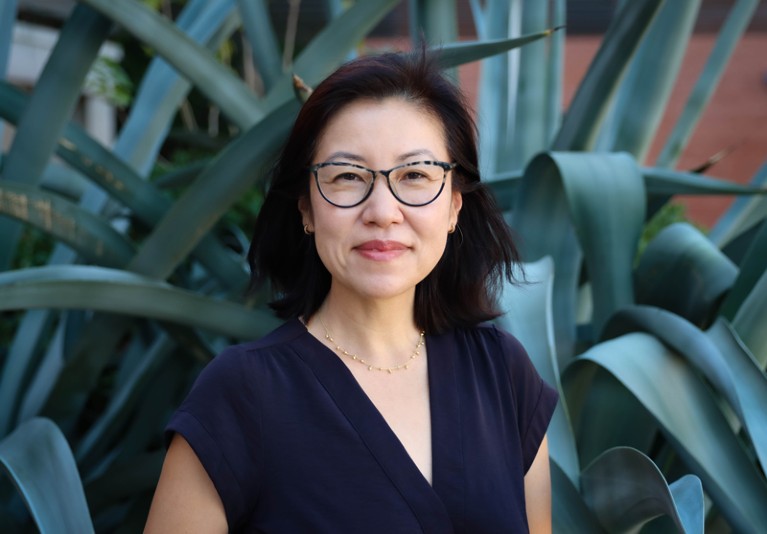
Jenny Lee has studied the China Initiative’s impact on the career plans of Chinese students.Credit: Univ. Arizona
Before signing the document, MIT physical chemist Gabriela Schlau-Cohen crossed out anything that would require her to interrogate her students. “We really don’t have the background or the training to bring interrogation into an education and research space,” she says.
Surveys of Chinese scientists over the past year portray an environment of fear. A study published in June 2023 surveyed US-based scientists of Chinese descent1. It found that 72% of respondents do not feel safe as an academic researcher, 61% have considered leaving the United States and 45% wish to avoid applying for federal grants despite having had them in the past.
Although the China Initiative was launched to stop espionage, a worrying number of high-profile cases were about disclosures on grant applications, explains Yu Xie, a Chinese American sociologist at Princeton University in New Jersey who co-authored the June 2023 study. According to the MIT Technology Review database, at least 26 of the 162 DoJ cases, including Chen’s, were predicated on researchers making false statements on grant applications. For example, Chen was charged with grant fraud for not disclosing his role as a grant reviewer for the National Natural Science Foundation of China when he applied for DoE funding, but was later acquitted.
When Nature asked the DoJ to comment on the rationale for targeting scientists who had made errors or omissions on grant applications, the department pointed to remarks made in February 2022 by assistant attorney-general Matthew Olsen on its updated policies. The statement acknowledged researchers’ concerns at that time:
“There are also increasing concerns from the academic and scientific community about the department’s pursuit of certain research grant fraud cases. We have heard that these prosecutions — and the public narrative they create — can lead to a chilling atmosphere for scientists and scholars that damages the scientific enterprise in this country.”
The statement went on to say that future investigations involving academia would use the DoJ’s National Security Division. This provides coordination between prosecutors and law enforcement, to better determine whether criminal prosecution is warranted. The statement confirms that, for cases involving academic integrity and research security, “the National Security Division will take an active supervisory role in the investigations and prosecutions. In evaluating cases moving forward, NSD will work with the FBI and other investigative agencies to assess the evidence of intent and materiality, as well as the nexus to our national or economic security.”
Xie says that Chinese researchers are scared about possible misconduct allegations or perceived non-compliance with federal regulations. One respondent to Xie’s survey was an early-career researcher who self-identified as a US citizen and a recipient of the prestigious National Science Foundation (NSF) CAREER Award, a five-year grant. He stated that he had quit his academic position because of the “anti-Chinese atmosphere”. He found the systemic corruption that he experienced “disgusting”, and felt it had ruined his academic career.
Loss of talent and funding
Early-career researchers are also struggling amid the scrutiny. In a preprint, Lee and her colleagues detail the impact of the China Initiative on the career plans of Chinese graduate students2. The authors found that the Chinese students were more likely than those who did not identify as Chinese to feel racially profiled. More than two-thirds (68.1%) of the Chinese students reported experiencing one of the following: anxiety about being surveilled or racially profiled by the US government; professional challenges regarding promotion or professional recognition; or difficulty obtaining research funding owing to race or nationality. By comparison, these issues were reported by one-third of students who did not identify as Chinese.
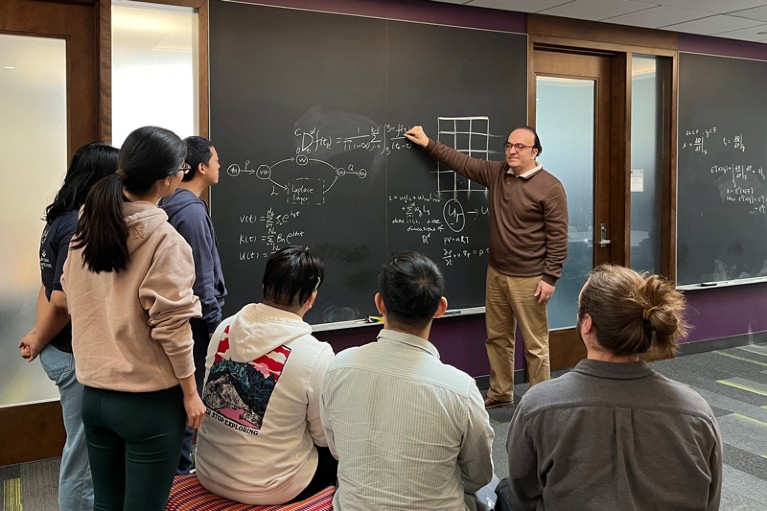
Mathematician George Karniadakis says Chinese students and postdocs in his group at Brown University in Providence, Rhode Island, have been interrogated at the US border, as has he.Credit: George Karniadakis
As soon as the China Initiative began, Kai Li, a computer scientist at Princeton University, feared for his and his family’s safety. He scaled down his research and stopped seeking federal funds. Li, who co-founded Data Domain, a California data-storage company, has had funding from the NSF and the Defense Advanced Research Projects Agency. Like Chen, Li has written recommendation letters for many students in other countries, given talks at Chinese universities and attended conferences in China.
“If that is criminal activity in the eyes of the FBI, then I don’t feel completely safe,” he says, emphasizing that the US government encouraged scientists to pursue collaborations with China in the first place. He points to the 1979 US–China Science and Technology Cooperation Agreement, which, until 2018, was renewed every five years. Full renewal of the pact was delayed last year, and seems likely to be delayed again after a 27 February deadline as negotiations continue.
Most troubling to Li is that “the US is losing talent”, a trend he describes as “a national security problem”. Li points to data in Xie and his colleagues’ paper1 showing that the rate at which Chinese scholars return to China jumped after 2018. “You won’t see the impact on US science and technology for at least a decade,” says Steven Chu, a physicist at Stanford University in California and a former US Secretary of Energy. “The idea that an undergraduate student in China comes to the US, has been groomed as a Manchurian candidate spy, doesn’t ring true to anything faculty members see,” he says.
Like many early-career researchers in the United States, a postdoc of Chinese descent who requested anonymity describes being at a professional crossroads. Eager to become a tenured professor, he is applying for faculty positions at both US and Chinese universities. The competition is intense in both countries, but the postdoc fears his ethnicity could prevent him from securing US federal-agency funding, making him less competitive in the United States. A recent job advertisement in his field specifies that candidates must be able to obtain and maintain a US Department of Defense security clearance. He says, “I do not think Chinese scholars have any chance to win this position, although it does not explicitly say it.”
“Chinese students now in the US feel that they don’t have a future in this country,” agrees Yiguang Ju, an aerospace engineer at Princeton University who moved to the United States after completing his PhD at Tohoku University in Sendai, Japan, in 1994. Two of his senior students took assistant professor positions to conduct plasma-modelling research at two separate universities in China. “I don’t think anyone else in the US can do” this research, he says, and notes that Chinese scholars find a warmer reception beyond the United States. At the Tokyo Institute of Technology, for example, roughly 55% of PhD students are from China.
Chu notes that US standing in science and technology has benefited greatly from foreign minds: “American Nobel laureates are about one-third first generation [immigrant] scientists.” However, some Chinese scientists in competitive, highly scrutinized areas such as engineering, physics and chemistry are choosing to pursue research interests that do not attract scrutiny or require security clearance.
To continue his research in the United States without undue scrutiny, Ju says, he switched his scientific pursuits from propulsion to renewable energy. In October, the DoE awarded him $5 million to lead the Energy Earthshot Research Center at Princeton, which is focused on clean hydrogen.
Chen has also switched his research focus to something less controversial. “In 2022, our semiconductor research was named a breakthrough of the year by Physics World,” says Chen. “Now, I work on water. I joke with people, there are no secrets in water,” he says. Chen leads a small group of five people, supported mainly by MIT grants.
The ties that bind
US–China collaborations have also been shaped by another, hard-to-quantify dynamic. In the context of academia, the Chinese word guanxi refers to an implicit, reciprocal obligation to form bonds between academics who share research interests, language, ethnicity and cultural understanding. In 2023, research by Lee and her team found that well-established ethnic-Chinese guanxi networks enabled faster access to crucial COVID-19 samples and first-hand knowledge of the pandemic in its earliest days3.
Lee fears that increased scrutiny and racial profiling could chip away at guanxi research networks between the two countries. In a preprint, Lee and her team published survey results from 91 US-based and 150 China-based scientists who were asked about the quality of current US–China collaborations on COVID-19 research4. Of the US-based scientists, 49 identified as ethnically Chinese. US Chinese and China-based scientists had deeper collaborations with each other and were more involved in designing experiments and data analysis than were US scientists who did not identify as Chinese, who instead had advisory roles after the research and analysis were completed.
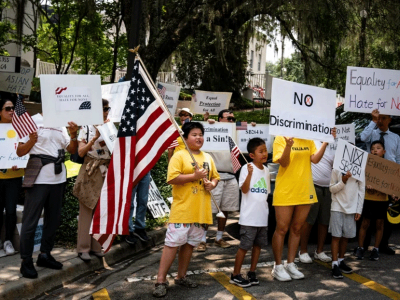
‘This is exclusion’: Florida law restricts hiring of researchers from seven countries
“The question is about the future — and whether new guanxi relationships will be formed,” Lee says. “The US is continuing to sabotage itself.” It is at risk of disrupting not only the flow of Chinese talent into the country, she says, but also US–China research collaborations.
In 2021, in response to Chen’s arrest and the rise in perceived racial profiling of Chinese scientists, researchers formed the Asian-American Scholar Forum (AASF), a non-profit organization in New York City. Its aim is to protect the rights of Asian Americans and immigrants and promote academic freedom and equality.
“As a scientist, I hadn’t really felt discriminated [against] or targeted since I came to the US — until the China Initiative,” says Li, who is AASF vice-president. “I read news and voted, but I didn’t participate in any organized politics. In some ways, the China Initiative activated us” as advocates, he says. “People feel safer, but still not safe enough.” For example, neither Li nor Chen plan to apply for federal grants.
Chinese scholars speak out
AASF members are now taking a proactive stance. Last May, the group laid out its priorities to work with policymakers to prevent the return of the China Initiative or similar policies5. It also aims to create systems of due process and accountability in both federal agencies and academic institutions.
“We’re in the process of working with the White House, federal grant agencies and Congress to make sure that Asian American scholars have a seat at the table. Their voices are really critical in ensuring that any [future] policies don’t have an unintended or disproportionate discriminatory impact towards the Asian American scholar community,” says Gisela Perez Kusakawa, executive director of the AASF.
Kusakawa says the AASF seeks to change the narrative about Asian American scholars by highlighting their contributions. “There’s this inherent perception and bias that Asian Americans and immigrants are not truly American; that they’re perpetually foreign, which feeds into this narrative that they’re not loyal to the United States and makes it easy to scapegoat them as threats,” says Kusakawa. “We want to show the world how much Asian Americans have been crucial to the growth and prosperity of the United States.”
However, there will be consequences if politics trumps science and the United States breaks ties with China in basic research, notes Chu. “We have as much to lose, if not more, than China,” he says. “It would be truly tragic if we did disengage intellectually from a rising scientific powerhouse.”
